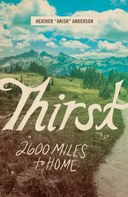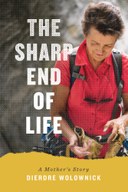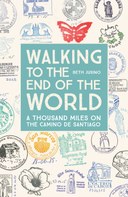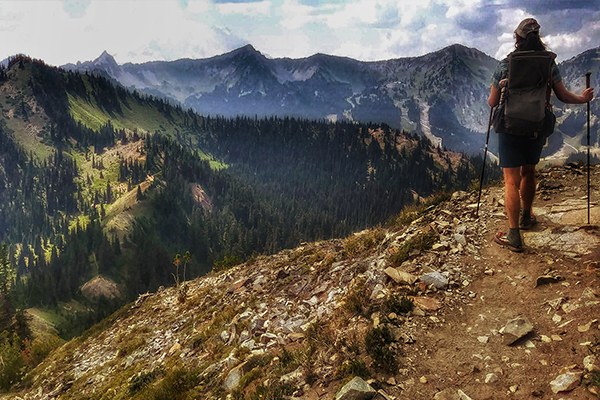
It takes a whole lot of gumption to take off on a journey by yourself, all the more for a woman on her own striding through the wild. When Heather "Anish" Anderson decided to set the self-supported Fastest Known Time for hiking the Pacific Crest Trail, she had the gumption but courage was something she had to work on. The following is an excerpt from her new memoir, Thirst: 2600 Miles from Home.
MOUNT HOOD NATIONAL FOREST, OREGON
DAY 49 / 50 MILES
I arrived at the alluvial destruction zone of the Sandy River. Two men were camped a short distance away, their tent tucked into a flattish, sandy area clear of the many rocks and uprooted trees that littered the glacial river’s wide floodplain. They waved me down and cautioned me not to cross until the morning.
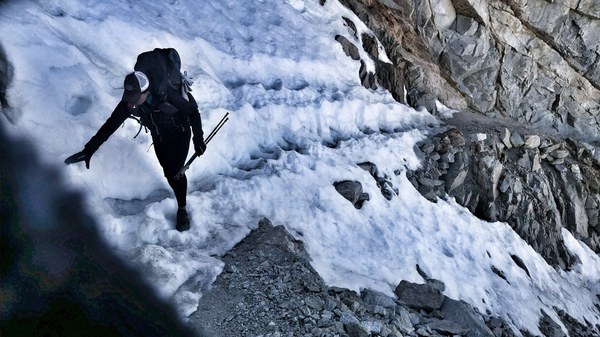
“You can camp here with us. It’s too dangerous tonight.”
I glanced at their roaring campfire. It was 9:15 p.m. and dusk was gathering. I picked up a sturdy-looking stick from their stockpile of firewood.
“I’ve gotta give it a try.”
At the bank, I stood with my stomach knotted as I watched the roiling, frigid glacial silt, fifteen feet wide. For a second, I was eighteen again and looking down at deep, vast Lake Powell from the edge of a thirty-foot cliff. Others were jumping in and I intended to as well. My stomach was in knots, but then—as now—I tried to be brave.
I thrust the stick into the chocolate milk torrent and nearly toppled over. It’s nearly four feet deep! I tried again and again, up and downstream, seeking smoother water without deep holes. Finally, I found a spot where it was only up to my mid-thigh, although whitewater broke around partially submerged boulders along my path.
After walking to the edge of the cliff and looking down at Lake Powell, I had known it was time to take back control of my fear of heights. There is a normal level of fear when confronted with falling into space. There is also irrational fear that can take you over. Deep breath. Three strides and I had been plummeting.
I stepped into the Sandy River.
Methodically, I worked my way across ten feet of river, plunging the stick as I probed blindly for firm footing. It was nearly dark and the racing water made my eyes swim with vertigo. Reaching the strongest channel of the current, I lifted my right foot to take a step and felt the water grab hold and slowly spin me to face downstream. There—in the never-ending tumult of pounding water disappearing down the flume—I glimpsed my demise. This is how it ends.
The water of Lake Powell had been dark and heavy, leaving me oddly suspended in time and space until I located an emerald glimmer above me. Reflexively, my limbs had grasped spasmodically for purchase to take me toward it.
It took everything I had to bring my foot back down to the bottom of the Sandy River in a controlled manner and regain my equilibrium.
I lifted my eyes from the churning and focused on reaching the rocks on the opposite bank, now only five feet away. Stab, step, stab, step. I breathed slowly and deeply to keep from shivering as the icy water stripped all my warmth away. How long have I been in this river? Ten minutes? Three? An hour? I could no longer feel my legs and feet, but the other side was still just beyond my reach.
Seconds after plunging into Lake Powell, my arms and legs had fallen into sync, every fiber and all my focus on the beckoning shimmer. Arid desert air filled my empty, burning lungs as I burst from the darkness into the light. I was free—exhilarated. With unexpected clarity I understood baptism, the way it felt to conquer fear, and the words: “Take up your mat and walk.”
At last, on numb, frozen stubs, I stumbled clumsily up the loose soil on the other side of the Sandy River. Turning, I lifted my arms in triumph. The men on the other side cheered. I threw down my stick, exhausted, and hobbled away.
My feet hurt as though they had been asleep for an eon. The grit in my shoes ground into my feet with such painful intensity that I wasn’t sure I could handle it. A half mile later, I stopped, sat on a log, and pulled them off. After changing socks, I scraped as much gravel out of my shoes as I could. Then, I hiked at maximum speed to rebuild the warmth and circulation that my body had lost in the river. Adrenaline from my brush with death spurred me forward. I knew that it was three miles—including a long climb up Bald Mountain—to my camp.
A few yards up the trail I pulled out my treat for the evening—a caffeinated gel. I swallowed it and began to power up the climb, head down. Switchback, switchback, switchback . . . As I neared a turn, I glanced up to see cougar eyes illuminated just feet from my face. Unlike my other encounters, I did not recoil or bark defensively. Instead, I lunged forward, arms over my head and I ROARED.
The lion did not pause for a second investigation. It turned tail and fled up the trail, disappearing into the night. Caffeine and adrenaline coursed through my body. I could literally feel the chemicals throbbing in my veins, and I shook with the visceral urge to physically lay hands on the opponent and fight it. I was done being afraid of the night, of lions, of failure—of anything. Chest heaving, I stood and stared in the direction it had gone.
I roared again.
When I had stepped away from the southern terminus fifty days before, it had been the biggest jump of my life. Since then, I’d felt as though I’d been falling the entire time—until that moment when I flung myself into the face of my greatest fear, ready to fight. After fifty days in freefall, I’d landed. I was the lioness now, roaming the day and night fearlessly. Willing to fight anything in my path. To take anything on, whether it be lions in the night or raging glacial rivers or the self-defeating voices that lived in the dark recesses of my own mind. I was now a living incarnation of courage.
I shattered the silent forest with my voice: “NOTHING. WILL STOP ME. FROM GETTING. TO CANADA!!!!”
I hiked onward. The adrenaline flooding my system made my legs feel light. The heady realization that I was no longer controlled by fear had me roaring at every cracking branch or twig. There is nothing on this mountain that won’t know that I am a lioness tonight.
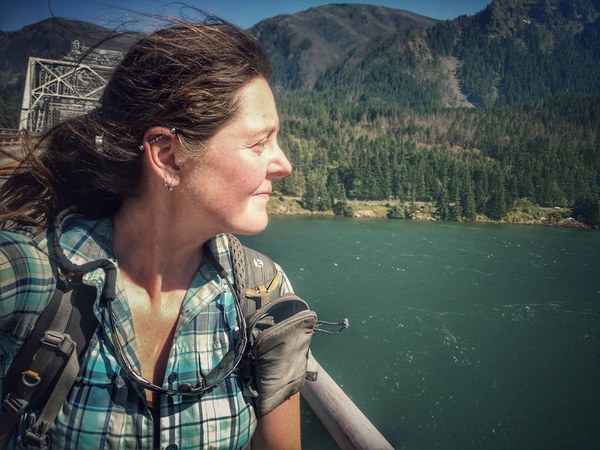
Heather is a National Geographic 2019 "Adventurer of the Year." Don't miss her presentation, March 12, in Seattle at The Mountaineers program center. Click here for more information on her events in March.
 Mountaineers Books
Mountaineers Books
